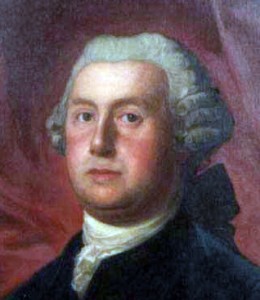John Adams as a Justice of the Peace?

Sewall played the eighteenth-century patronage game, angling for appointments from powerful officials rather than elective office. In the eighteenth-century British Empire, many gentlemen did the same. It was how the imperial government operated. And there was a certain logic to it.
In the early 1760s, Sewall privately sniped at the leaders of both of Massachusetts’s political factions, Thomas Hutchinson and James Otis, Jr., while watching for opportunities. He stayed clear of ideology.
Then in 1762 Gov. Francis Bernard (shown here) appointed Sewall to be a justice of the peace. Seeing an opening on the side of the court party, in February 1763 Sewall published the first of many pseudonymous newspaper essays supporting Bernard and Hutchinson.
Eventually that worked. In March 1767, Bernard made Sewall a “special attorney general,” in line to succeed Jeremiah Gridley. Since that wasn’t strictly legal, Bernard created a new position called solicitor general and named Sewall to that post in June. In November, Sewall became attorney general and advocate general, though he also retained the solicitor general title.
At some point in the mid-1760s, according to some fellow Loyalists over a decade later, Sewall tried to entice his friend John Adams to start climbing the same path.
This is the story that Hutchinson recorded in his diary on 22 Oct 1778, while he was in exile in London:
Mr. [Richard] Clarke and [Samuel] Quincy in the evening. They both agreed in an anecdote, which I never heard before—That when the dispute between the Kingdom and the Colonies began to grow serious, John Adams said to Sewall that he was at a loss which side to take, but it was time to determine.Clarke and Quincy dated Sewall’s attempt to before 1767 and his appointment as Massachusetts attorney general. Quincy was friendly with both Adams and Sewall, and related to both of their wives, so he seems like a reliable source on how Sewall saw the affair.
Sewall advised to the side of Government, and proposed to Governor Bernard to make Adams a Justice of Peace, as the first step to importance. Bernard made a difficulty on account of something personal between him and Adams, but Sewall urged him to consider of it a week, or some short time, and acquainted Adams the Governor had it under consideration, but Adams disliked the delay, and observed, that it must be from some prejudice against him, and resolved to take the other side.
Sewall was superior to Adams, and soon became Attorney-General and, one of the Superior Judges of Admiralty. Adams is now Ambassador from the United States to the Court of France, and Sewall a Refugee in England, and dependent upon Government for temporary support. Such is the instability of all human affairs.
At the same time, this version of the anecdote reflects a Tory perspective on the Massachusetts Whigs—that their opposition was driven by thwarted ambition and perceived slights rather than political principles. The patronage system was founded, after all, on interpersonal relations and loyalties.
In fact, Adams’s distaste for Sewall’s politics, even as he liked the man, went back to 1763. Weeks after Sewall’s first newspaper essay, Adams published his own first letter as the rustic “Humphrey Ploughjogger” to complain about “grate men [who] dus nothin but quaril with one anuther and put peces in the nues paper.”
When Sewall defended Bernard and Hutchinson as “J,” Adams responded as “U” to say:
Mr. J inlisted himself under the banners of a faction, and employed his agreable pen, in the propagation of the principles and prejudices of a party: and for this purpose he found himself obliged to exalt some characters and depress others, equally beyond the truth— . . . Many of the ablest tongues and pens, have in every age been employ’d in the foolish, deluded, and pernicious flattery of one set of partisans; and in furious, prostitute invectives against another:Then in late 1765 Adams came out firmly against the Stamp Act in another “Ploughjogger” letter, the instructions he drafted for Braintree’s representatives in the Massachusetts General Court, and the essays eventually titled A Dissertation on the Canon and Feudal Law. So it wasn’t hard to see what side of the political divide he was on by then.
Nonetheless, Sewall tried again to win Adams over to the court party.
COMING UP: Another job offer for John Adams.

No comments:
Post a Comment